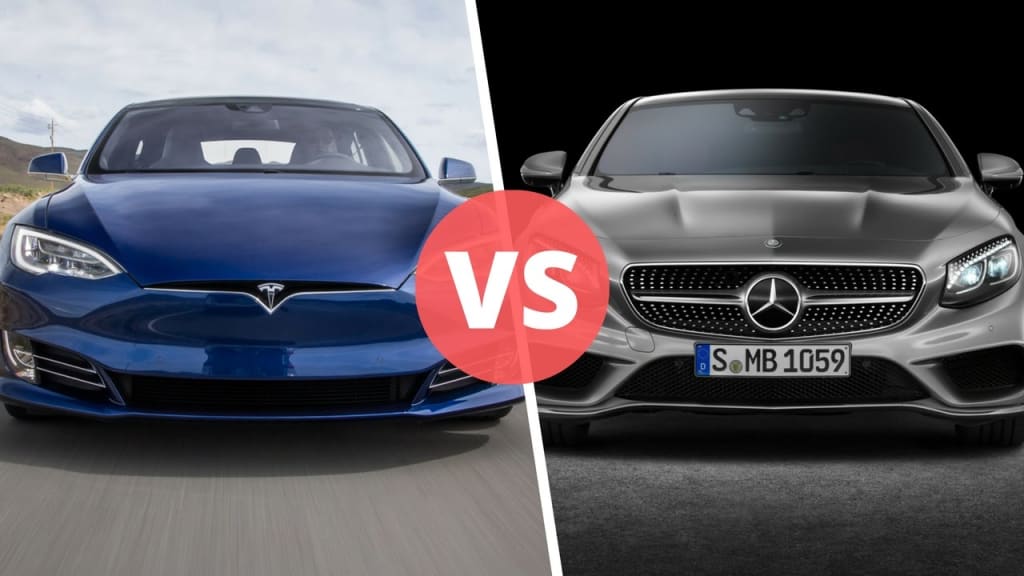"The Battle for Supremacy: Tesla vs Traditional Automakers"
Electric vs Gas cars

The battle for supremacy between Tesla and traditional automakers has been a hot topic in the car industry in recent years. Tesla, founded in 2003, has disrupted the industry with its innovative electric cars and cutting-edge technology. Traditional automakers, on the other hand, have been slow to adapt to the changing landscape of the industry.
Tesla's success has been driven by a number of factors, including its ability to create a brand that resonates with consumers, its focus on sustainability, and its commitment to innovation. The company's electric cars are known for their long range, high performance, and sleek design, and Tesla has been a leader in developing autonomous driving technology.
Traditional automakers have been playing catch-up with Tesla, investing heavily in electric vehicle technology and developing their own autonomous driving systems. However, they have been facing a number of challenges, including the high cost of developing electric cars, the need to adapt their existing manufacturing processes, and a lack of brand recognition in the electric vehicle market.
Despite these challenges, traditional automakers are making progress in the electric vehicle market. Many have announced plans to release electric versions of their most popular models, and some have even set ambitious targets for phasing out gas-powered cars altogether. The battle for supremacy between Tesla and traditional automakers is far from over, but one thing is clear: the future of the car industry is electric.
What are some of the benefits of electric cars over gas-powered cars?
There are several benefits of electric cars over gas-powered cars, including:
1. Environmental benefits: Electric cars produce little to no emissions, which makes them better for the environment than gas-powered cars. They can help reduce air pollution and greenhouse gas emissions, which can have a positive impact on climate change.
2. Lower operating costs: Electric cars are more efficient than gas-powered cars, which means they cost less to operate. They require less maintenance and have lower fuel costs, which can save owners a significant amount of money over the life of the vehicle.
3. Quieter operation: Electric cars are quieter than gas-powered cars, which can make for a more peaceful driving experience.
4. Better performance: Electric cars have instant torque, which means they can accelerate quickly and smoothly. They also tend to have a lower center of gravity, which can improve handling and stability.
5. Energy security: Electric cars can be powered by a variety of sources, including renewable energy sources like solar and wind power. This can reduce dependence on foreign oil and increase energy security.
6. Government incentives: Many governments offer incentives, such as tax credits or rebates, for purchasing electric cars. These incentives can help offset the higher upfront cost of electric cars and make them more affordable for consumers.
The benefits of electric cars make them an attractive option for many consumers who are looking for a more efficient, environmentally friendly, and cost-effective way to get around.
What are some of the drawbacks of electric cars?
While electric cars have many benefits, there are also some drawbacks to consider, including:
1. Limited range: Electric cars typically have a shorter range than gas-powered cars, which can make them less practical for long-distance travel. However, the range of electric cars is improving with advances in battery technology.
2. Longer charging times: Charging an electric car can take significantly longer than filling up a gas tank. Even with fast charging technology, it can take anywhere from 30 minutes to several hours to fully charge an electric car.
3. Higher upfront cost: Electric cars are often more expensive than gas-powered cars, although the cost is coming down as the technology becomes more widespread.
4. Limited charging infrastructure: While there are more electric charging stations available now than ever before, they are still not as widespread or convenient as gas stations. This can make it difficult to take long road trips in an electric car.
5. Battery degradation: The batteries in electric cars degrade over time, which can reduce their range and performance. However, battery technology is improving, and many electric cars now come with warranties that cover battery replacements.
6. Heavy reliance on electricity: While electric cars are more environmentally friendly than gas-powered cars, they still rely on electricity to operate. If the electricity used to charge the car comes from sources that are not renewable, such as coal or natural gas, then the environmental benefits are reduced.
The drawbacks of electric cars are becoming less significant as technology improves and infrastructure expands. However, consumers should carefully consider these factors when deciding whether to purchase an electric car.
Like and Subscrtibe if you like our content.
About the Creator
Car Community
high quality car stories , everything you should know about every car ever made.






Comments
There are no comments for this story
Be the first to respond and start the conversation.